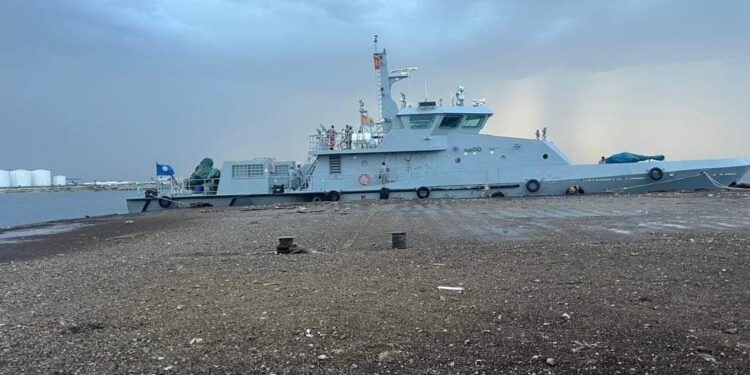Eritrean President Isaias Afwerki receiving Lt. Gen. Abdel Fattah al-Burhan in Asmara, September 2023 (Sudanese Sovereignty Council “Facebook”)
Published: 19:35 - 27 July 2024 AD - 21 Muharram 1446 AH
In a surprising move, Eritrean warships docked on Friday off the Sudanese coast, sparking a major controversy over their motives at this time when the country is witnessing fighting between the army and the Rapid Support Forces, and after Asmara’s sudden decision to expel a Sudanese diplomat, a move that political analysts considered an expression of the strong relations between the two countries, and a message to regional countries that Eritrea stands with the Sudanese army.
In another context, Asharq Al-Awsat learned from informed sources that the Chairman of the Sovereignty Council and Commander of the Sudanese Army, Abdel Fattah Al-Burhan, sent a high-ranking official to Cairo, carrying a message to the Egyptian President, Abdel Fattah Al-Sisi, to visit Port Sudan. The invitations also included the Eritrean President, Isaias Afwerki, and the Ugandan President, Yoweri Museveni.
The Sudanese Navy received the Eritrean vessels, which came under the directives of President Afwerki, to confirm his "support for the brotherly Sudanese people in these circumstances that the country is going through", and to consolidate the solid relations between the two peoples, according to Sudanese military officials. The Eritrean delegation was received by senior leaders of the Sudanese Navy.
This step comes after the Eritrean government declared the Sudanese Chargé d'Affaires, Khaled Hassan, persona non grata, and gave him 3 days to leave, which ended with the arrival of its warships in Port Sudan.
Sudanese Foreign Ministry Undersecretary Hussein Al-Amin said in a press conference last Thursday in Port Sudan, the interim capital, that his country is awaiting clarification from Asmara on the decision to expel its ambassador.
The Sudanese army enjoys good relations with Afwerki, and the assistant commander-in-chief of the army, Lieutenant General Yasser Al-Atta, previously praised his positions after he attacked the leaders of a number of countries neighboring Sudan, and explicitly accused them of supporting and backing the “Rapid Support Forces” in the war against the army.
The head of the Eritrean naval delegation said in a video recording: “We have arrived in this difficult circumstance to confirm that we are with Sudan’s just cause, and we always stand with the leaders of the army, navy, infantry and air force,” adding: “We hope that Sudan will overcome this stage, and our position is firm in rejecting foreign interventions.” The Eritrean official stressed the continuation of relations and visits between the two countries, which confirm the strong strategic alliance that serves the interests of both countries.
Sudanese political analyst Saleh Amar says, “The relationship between the Eritrean president and the Sudanese army commander Abdel Fattah al-Burhan developed and became stronger a few months after the outbreak of war in Sudan between the army and the Rapid Support Forces,” adding that “this matter was announced in advance.”
Message to Ethiopia
He considered Eritrea's move to send naval units to the Sudanese coast as "a message to Ethiopia and other regional countries" that relations between Eritrea and Sudan are strong and "that it is ready to protect it." Saleh attributed the Eritrean position to the allegations of close relations between Ethiopia and other countries and the "Rapid Support Forces," which they see as a threat to them.
The political analyst explained in his interview with Asharq Al-Awsat that the tension in relations between the two countries, which led to the Eritrean government taking a sudden decision to expel the Sudanese ambassador, came as a reaction to the visit made by Ethiopian Prime Minister Abiy Ahmed to Port Sudan and his meeting with the Sudanese army commander.
He said, "The Sudanese ports on the Red Sea coast have received, over the past years, warships and commercial ships from Russia, Iran and other countries within the framework of joint cooperation with Sudan, but Eritrea may have intended this visit at this time to indicate the strength of its alliance with the Sudanese army."
He ruled out that the move was coordinated between Eritrea and Russia, or related to the international conflict in the Red Sea region, noting that Eritrea would not take any action that could harm its main allies in the region.
In turn, political analyst, Al-Jamil Al-Fadil, saw that the presence of Eritrean naval warships in Port Sudan at this time gives an indication of the army’s moral support, at least, in its war against the “Rapid Support.”
He said: “Since the sudden expulsion of the Sudanese Chargé d’Affaires from Asmara, developments have taken on a dramatic character through the broadcast of images of a meeting between President Isaias Afwerki and the leader of the Sudanese Beja tribes, Mohamed El Amin Turk, and of course this was immediately followed by the visit of Eritrean warships to Port Sudan.”
He added, "What links these events is that they came in the wake of the mysterious visit of Ethiopian Prime Minister Abiy Ahmed to Port Sudan." He pointed out that "Asmara has begun to feel that it is being excluded from the settlement efforts in Sudan, and its recent move expresses its discontent and refusal to be excluded from the regional and international efforts currently underway to make the American initiative seeking to end the war in Sudan a success."







